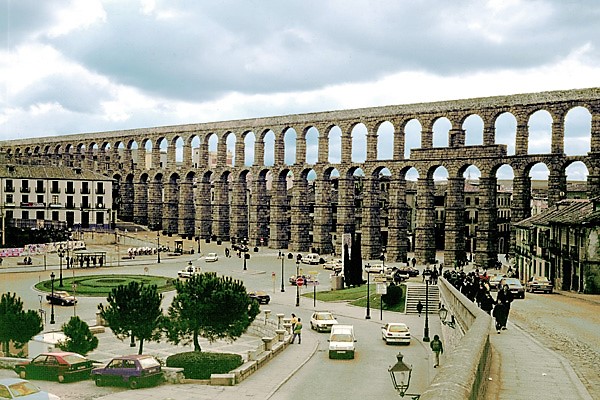If You Want to be Appy for the Rest of Your Life
Tuesday, August 24, 2021
Events in far-away Afghanistan are disturbing: an old-fashioned cult of fundamentalists, who are against women, abortion, euthanasia, homosexuals, schools, miniskirts and democracy, have taken over the whole country in just a week.
It makes one think - could the Vox (a fundamentalist group with a similar ideology, tidied up a bit for those nostalgic for Franco) do the same thing here in Spain?
No one appears to have been prepared, which is profoundly odd. It certainly caught-out those who think that a sling-shot isn't as powerful as a bomb, or that a Book can be beaten by Western Thought. Presumably, the Afghans knew that the allies were pulling out and that the Taliban would take over. Apart, or course, from the huge majority of people who live in the country and, as always with these revolutions, didn't have a clue. I don't suppose they have the Internet or the Pashtun equivalent of The Daily Express in Chaghcharan. Perhaps they thought it would be a good thing anyway - their own destiny rather than that of some gum-chewing invaders. Isn't life odd.
But there are still chores that must be done: the animals need to be fed, the women stoned and the crops watered (and in the Afghani case, turned into opium).
Such were my thoughts yesterday as I picked a large and amiable country-rat out of the chicken-feed and sent him on his way. Luckily my wife doesn't read my stuff - she doesn't speak English - so the rat has some more days of fun and toil to look forward to before we must put out the poison.
The chickens had managed half-a-dozen eggs between them since the day before. Unfortunately, I have become a little tired of eating eggs over the past month of holidays and our riding-classes (and egg-buyers) are still a week off.
Needless to say, horses don't have holidays.
One of the tasks before us - as of yesterday - was to acquire a new bombproof pony for our younger riders. We have a school located just outside Almería City catering to riders of all sizes, prices on request. So, we took the car out of the garage, washed the dust off it, and headed off to a village in Granada where the Duke of Wellington has a major estate - the gift of a Grateful Nation following the Napoleonic Invasion.
Perhaps the Taliban will give Donald Trump a chunk of land for him to build a mansion on and where he can be quietly exiled to - for services rendered.
Driving up from the coast, we passed the frontier pueblo of Fiñana on our right. Fiñana is a sad place. It has a population of around 2,000 souls (it was 5,000 a generation ago). The citizens spend their time, whenever they find themselves near a window, looking out at some 120 gigantic aerogenerators - those giant windmills that spin all day (and perversely wink either red or white lights all night). These generators bring electricity. I read that one of them can power 500 homes. There are currently nineteen of these parks in Almería. Just crossing into Granada - the first time we've been out of Almería in over two years - we saw a second enormous clutch of 130 more of the windmills located on that enormous plane south of Guadix.
So why is Spain's electricity so expensive with all these machines that can reach up to 100 metres in height working on the free energy provided by the wind? Huh? Would the Taliban or Vox approve? Shouldn't we be using candles?
After getting to Granada, we were obliged to rely on another example of modern tech, in the shape of a rolling map on the mobile phone which would, we hoped, bring us to our destination: a small farm in the hills some 20kms beyond the city.
As we arrived, a small boy was heading off - at some speed - down the road on the back of a pony. On his return, we saw the animal for the first time. Beautiful, said Alicia. Ugly as hell, I mumbled into my mask.
Granddad tottered out and said the boy had grown and now needed a horse. We duly crossed his withered palm with silver.
So now we must return in a couple of days with the trailer to pick up our new friend, who will no longer be called Manolito, but will now answer instead to Appy.
I can only hope my friend the rat approves.
 3
Like
Published at 7:03 PM Comments (8)
3
Like
Published at 7:03 PM Comments (8)
A Hot Bath
Monday, August 16, 2021
I'm of the opinion that the best way to cool down on a hot day is to enjoy a cup of tea. It needs to be hot, not like the stuff the Americans drink, with bits of ice and lemon (if you're lucky) floating in it, but hot and faintly milky. My theory is that it cools you down by putting your internal AC in overdrive. Maybe a biscuit too while you're in the kitchen. Umm, lovely.
Even better is to have a long hot bath. Indeed, with no power or water cuts in Paradise today, for a change, and with everyone gone to the beach, I had soon talked myself into bubbling gently in a steamy soupy tub while practicing my scales.
The Romans had an impressive water system, based on the laws of gravity. Their aqueducts were designed to allow water to fall exactly seventeen cms per kilometre, a speed that allows for the smallest speed of flow. These aqueducts fed public fountains, some wealthier private homes, and above all, the public baths, which Romans felt was the nadir of their civilization. In their baths, they were cleansed physically and mentally. To a Roman citizen, the baths were civilization.
Rome, by the first century AD, had 420 kilometres of aqueducts feeding it from different sources. A hydrographer recently noted that New York didn’t overtake Ancient Rome in volume of water consumed until 1985, and the Romans, of course, had neither electricity or pumps, or rubber washers or plastic piping to help them.
Or immersion heaters, come to think of it. Maybe they had slaves lurking under the house armed with some fire-wood and an early plastic lighter instead.
Some of those remarkable aqueducts, built two thousand years ago and used to refresh all of their cities throughout the Empire, are still extant and there are even a few left in Spain, including some that still work! Water was rarely a problem which is how they could build such large cities.
I don’t care for showers. They are violent, fast, and efficient rather like a flight with Ryanair. To continue the simile, a bath is slow and pleasant, roomy and cultural (that is, if you read a book in the tub or listen to the radio or you like to sing). A bath has the same finality but takes its time, a bit like the train to Madrid.
Bathing has always been a civilized event, as can be shown by the Arabs with their hammam, and the Scandinavians, the Russians and the Japanese with their different traditions. Saunas, Turkish baths, Jacuzzis and the rest of them are for relaxing in and, yes, wasting a bit of water.
The average amount of water used by a Spaniard is apparently 135 litres per day. That's to say, a couple of goes on the lavatory, a shower, washing a few dishes and one's teeth, a shave, a coffee and a quick squirt with the watering can along the window-box.
According to Google, that's about the same amount that goes into my bath.
Luckily, we have a well.
 3
Like
Published at 7:00 PM Comments (1)
3
Like
Published at 7:00 PM Comments (1)
Three Bites to the Cherry
Tuesday, August 10, 2021
There’s been quite a lot of traffic on the Social Media about whether or not to support British bars – or perhaps ‘British business’ in general. Some people argue that, since we are living in Spain, we should be supporting the Spanish. I wouldn’t be surprised to read somewhere that the Spanish are of the same opinion. However, we all need to make or earn or, at least, obtain enough money to keep us going, Spaniards and Brits alike.
There are, broadly speaking, three different types of Britons coming to Spain (if you consider this part of the Iberian peninsular as being ‘Spain’ since most towns around here now have more foreigners than they do locals). Three types.
The first are those who live here on monies from ‘home’, perhaps a cheque in the mail from parents grateful to hear that you are ‘doing well over there’ and have no thoughts ‘of returning just yet’. More seriously, there are many of us who live comfortably on an income. They typically are retired and have tim e to travel around Spain, perhaps ‘Parador hopping’ or the occasional shopping trip down to Marbella or Gibraltar - or maybe they prefer to spend their time at home, gardening or entertaining. This group, as far as Spain is concerned, is most welcome. They spend freely and they don’t ‘take away anyone’s jobs’. Despite some indignant Facebook posts to the contrary, I think that the majority of Brits living in Spain fall into this catagory. These days, there's an unfortunate sub-group among the long-timers - those who have failed to get their residence papers - the ones worried now about the precise meaning of the ninety-day rule. e to travel around Spain, perhaps ‘Parador hopping’ or the occasional shopping trip down to Marbella or Gibraltar - or maybe they prefer to spend their time at home, gardening or entertaining. This group, as far as Spain is concerned, is most welcome. They spend freely and they don’t ‘take away anyone’s jobs’. Despite some indignant Facebook posts to the contrary, I think that the majority of Brits living in Spain fall into this catagory. These days, there's an unfortunate sub-group among the long-timers - those who have failed to get their residence papers - the ones worried now about the precise meaning of the ninety-day rule.
The second group is those who wanted to come and live here, perhaps tired of the modern society of Great Britain and Northern Ireland. Appalled, maybe, by Brexit and its unstated disdain towards foreigners. Sick of the dull grind where people grudgingly admit that ‘they manage’ with any apparent enthusiasm for their sad existence. They move out here, perhaps a little younger than the first group, in search of a better life. They will have to work here to live, perhaps a bar or some small business to keep them going. It is this group that attracts the attention of the Facebook brigade. Should we support them or should we prefer to use the Spanish, they wonder.
I agree that this is a wonderful place to live and if – all other things being equal – a Briton opens a business then we should be glad to help and favour him with our business. Why on earth not? It’s hard enough here – Spanish clients are not generally going to come in droves, the taxes and stock are usually a bit higher and the rules can be a bit tighter. Witness the Brits who took over a bar in my pueblo some years back. They were told they couldn’t use the terrace. A year later, now with local owners, the same bar is spread all over the terrace and halfway into the street.
Furthermore, there is always small teething problems associated with running a business in a foreign country. An evidently brand-new bar owner once asked me how to cook some sardines as his Spanish customer had evinced some interest in enjoying some with his beer. ‘Bloody hell’, I told him ‘not the foggiest’. I feel sorry now – he shut a few weeks later.
It’s a shame when people come out here, full of hope for a better life, with their children and their possessions, only to find that their plan for a small business will run up against indifference, jealousy, obstructionism or other trials. We should support them not just as ‘fellow Brits’ but as people who have made a gamble with life. They didn’t sit still.
The third group, small but always in evidence, is made up of ‘chancers’. They will be running on dry and without any thought to return to their country. They will live vicariously off the rest of us, either cadging drinks, working for a morning painting our wall, or perhaps, coming up with a small con. It's hard pulling the wool over a Spaniard's eyes, so their prey will be their 'Fellow Brits'. If things go pear-shaped, they can always do a midnight flit.
However, they too are welcome. It sounds savage back there in Rochdale.
...
*Many thanks to those who enjoy my articles - most appreciated! To those with criticism on some of my remarks - all I can say here is 'noted'!
 5
Like
Published at 10:25 AM Comments (8)
5
Like
Published at 10:25 AM Comments (8)
A Class Act
Tuesday, August 3, 2021
An American woman I know comes up to me: ‘I met this man from Yorkshire’, she says, pronouncing it yawkshiyuh, ‘who thinks you don’t like him because of his accent’.
‘Don’t be silly’, I answer automatically.
We live in a town where almost everyone comes from Somewhere Else. Most people here have different backgrounds, different experiences and, naturally enough, different accents.
We didn’t share the same teachers, mayors, clergy or football teams, things which mark out ordinary communities where you may know what someone thinks or is going to say before he opens his mouth. Here, we are a melting pot of Germans, Spanish, Rumanians, Chinese, Britons, Americans and everything else. We all get along since we are a small community and as long as we can be understood. Communication is everything.
However, unfortunately for the English, who are often monolingual anyway, that's not the case. With the English, accents are everything. To hell with what someone is saying, in a foreign language or in our own. If it sounds wrong then we won't engage.
I have either a ‘middle Atlantic accent’, or ‘no accent at all’ or a ‘fruity la-di-da’ voice depending on who you ask. I’m comfortable with it (unlike a school-friend who carefully learned to speak cockney) and my English is easy to understand when talking to practically anybody. BBC stuff. You know.
Particularly when explaining something to a German. Nice and easy there, Helmut!
I walked into an Irish bar the other day and ordered a Guinness. IRA songs were playing on the music system. ‘I shot a British soljer’ goes one of them ‘straite between de oiyes’. Lovely. The barman asks how long I’ve been here. ‘Fifty years man and boy’, I tell him. ‘Why, sure and you haven’t lost yer accent’, he says.
Another time, I meet somebody: ‘how de do?’ I ask. ‘Oh yuss, ‘ow di doody’, they answer, taking the piss.
George Bernard Shaw said: ‘No sooner does an Englishman open his mouth than another Englishman despises him’. How true. And what a shame. My own feeling is, as long as I can understand what someone is saying, we are moving forward. There are some ugly accents, which are those that sound odd to somebody’s ear. I don’t like such-and-such an accent, and perhaps they don’t like mine.
I speak with German friends, or American friends or what-have-you. The subject doesn’t arise. It’s not a subject which overly concerns the Spanish either. They might think I sound ‘inglés’ when I’m talking in ‘castellano’, but it’s of no consequence. I was once live on the radio when a listener from Seville came on the air. 'After all these years in Spain, you still have an English accent', she said. I answered - 'Señora: after a lifetime in Seville, you still sound like una andaluza '.
Curiously, the children here often have more marked regional accents than their parents. I know Manchester kids who have never visited their own country, and yet still remain incomprehens ible. How can this be? Shouldn’t all of us, in the decades to come, start to create our own homogenised way of speaking? Shouldn’t we become, eventually, something like the two-language-speaking Gibraltarians? ible. How can this be? Shouldn’t all of us, in the decades to come, start to create our own homogenised way of speaking? Shouldn’t we become, eventually, something like the two-language-speaking Gibraltarians?
We bring a lot of useless baggage with us when we come to Spain.
Discriminations, class, accents, regional ideas and so on. It's better to drop them off at the gate.
We can improve our life here - by getting to know our new area, by voting, learning Spanish, watching local television and adapting ourselves to our new environment; by taking siestas and drinking wine; by knowing our way round our nearby cities and by knowing Spaniards – as well as everyone else who crosses our path. In short, we have the opportunity to become émigrés. Better still - our children have the chance to become Europeans. The alternative to this is to act and consider ourselves as exiles – consuming ‘English’ stuff, reading ‘English’ newspapers and watching SKY (television that deals, of course, with a place where you no longer live). That way, we miss most of what Spain has to offer.
Next time I see that Yorkshireman, I'll buy him una cerveza...
 6
Like
Published at 12:08 PM Comments (5)
6
Like
Published at 12:08 PM Comments (5)
Spam post or Abuse? Please let us know
|
|